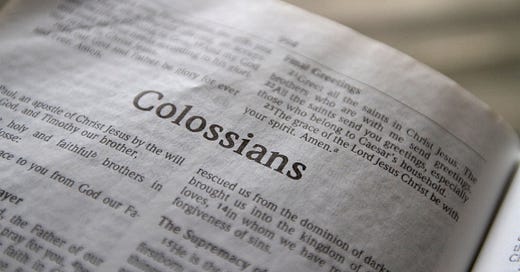If you are looking for the beginning of the study for the Apostle Paul’s letter to the Colossians then you can go HERE for a brief introduction. At the bottom of the introduction you will find the links to each section of the study guide as it becomes available. If you would like to see the growing list of book studies available for free on this site you can go HERE. Enjoy!
Virtues/Vices/Great Ideas: (Find them in the Text)
Being Chosen, Appearance vs. Reality, Indulgence
Grammar Questions: (The Information of the Text)
According to Paul, what is God’s “mystery” which has now been revealed?
What two things did Paul rejoice to see present in the church at Colossae?
What warning did Paul give to the Colossians, urging that they should not become “captive by?”
What did Paul say that Jesus Christ had “the whole fullness of?”
What did God “cancel” for believers?
How did God bring about this cancellation?
For what sort of things did Paul say the Colossians should not allow anyone to “pass judgment” upon them?
What did Paul say has “the appearance of wisdom” but is ultimately “of no value?”
Logic Questions: (Interpreting, Comparing/Contrasting, Reasoning)
What does the church in Laodicea appear to have in common with Colossae according to Paul’s comment about them?
Paul says, “as you received Christ Jesus the Lord, so walk in him.” What does it mean to “walk in” Jesus Christ?
What is Paul referring to as “the elemental spirits of the world?” (See verses 8 and 20)
What is the relationship between the “circumcision of Christ” and being “buried with [Christ] in baptism?” What implications may be inferred from the connection being made between circumcision and baptism?
What did Paul mean when he said that God “disarmed the rulers and authorities and put them to open shame?” How did he do this?
What is the connection between what Paul says in verses 8-15 and his transition to talking about food, drink, and festivals in verse 16?
What did Paul mean by calling the things mentioned in verse 16 “shadows” whereas Christ is the “substance?” Is Paul saying that the shadows are unimportant?
In verses 10 and 19 (and back in Ch. 1:18) Jesus Christ is referred to as the “head” in various ways. What is the summary meaning of using such headship language concerning Christ? What should be out takeaway from Paul’s use of this language?
Why might “asceticism” be of “no value in stopping the indulgence of the flesh?” Contrarily, what might be of more value toward that goal?
Rhetoric Questions: (The Analysis of Ideas in the Text)
Paul warns the Colossians not to let anyone delude them by the use of “plausible arguments.” Offer a definition for the term “truth.” What is the difference between a “plausible argument” and a “true argument?” What steps can we take to distinguish what is true from what is only plausible?
Paul said that God canceled “the record of debt that stood against us with its legal demands” and that he did so by “nailing it to the cross.” Would it be possible for God to clear our debt without the cross? If so, how? If not, why not?
Paul warns the Colossian Christians to be wary of “philosophy and empty deceit, according to human tradition.” What is a good definition for Philosophy? Is all philosophy empty and deceitful or do you think Paul is warning of a specific kind? If you think all philosophy is deceitful and empty, explain why. If you think there are important distinctions to be made here, what are they?
Does asceticism of any kind have any place in the Christian religion? Why or why not?
Theological Analysis: (Sola Scriptura)
Paul says of Christ that in him “are hidden all the treasures of wisdom and knowledge. Relate this to what the psalmist wrote in Psalm 111. What should we conclude about Christ from this connection?
Read Genesis 17:1-14 and also Acts 2:37-39. How do these passages further your understanding about the connection Paul is making between circumcision and baptism in Colossians?
Read Hebrews 8 and 10:1-10. How does this add light to what Paul says about food, drink, festival, and Sabbath being “a shadow of the things to come?”
Paul wrote that in Christ “the whole fullness of deity dwells bodily.” In Acts 13:9 the Scripture tells us that Paul himself was “Filled with the Holy Spirit” and in Ephesians 5:18 Paul commands believers to “be filled with the spirit.” Other such examples of the filling of the Holy Spirit could be given. What is similar and what is different about the way Paul is speaking of Jesus Christ in Colossians 2:9 as opposed to other incidents where believers are “filled with the Holy Spirit” throughout Scripture? Why are the differences critically important?



